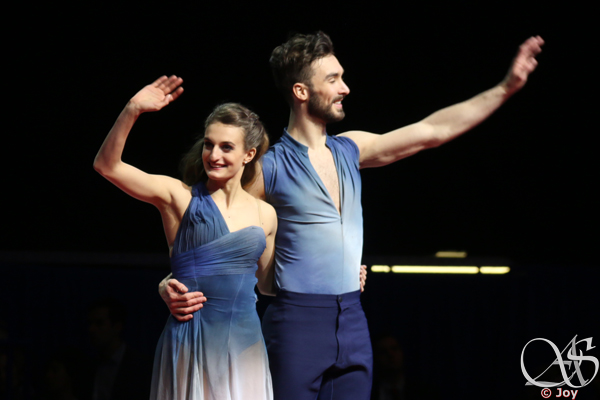Guillaume Cizeron: "It's definitely more difficult to keep the world title than to win it the first time!"
March 27, 2017
By Asli
Photos © Asli, Mireille Geurts & Joy
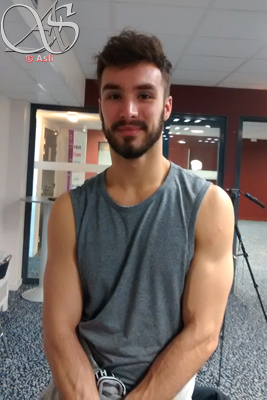 Gabriella Papadakis and Guillaume Cizeron have just won an incredible third European title in their fourth senior competitive season. We talked with Guillaume about their programs, their thoughts about their skating, their training conditions and his aspirations off-ice.
Gabriella Papadakis and Guillaume Cizeron have just won an incredible third European title in their fourth senior competitive season. We talked with Guillaume about their programs, their thoughts about their skating, their training conditions and his aspirations off-ice.
Only two years ago, you were young and up-and-coming ice dancers in your first senior year. Now you are two-time World Champions. How does this affect your program choices? Do you feel more free? Do you feel you can do whatever you want?
It's more complex. We feel more pressure, there are expectations that we want and need to fulfill, but we also want to make music and program choices that we feel connected to. We always want to push ourselves and discover new things, but this may be risky. It's hard to try new things and keep that in the framework of the competition, to remain competitive.
Is it more difficult to try to become World Champions for the first time or to keep the title?
Definitely harder to try to keep it. Mentally and in every way. Winning was unexpected so now for us it is harder to keep it.
Our focus is on more complex ways of moving, different energies.
In your junior career you showed great versatility. Your Jailhouse Rock free dance, your tango and your Pink Floyd free dance were very different from one another in terms of rhythm as well as style and mood. In your senior career, however, even though this year's free dance has a different theme and is choreographically different, the rhythm and the mood of the dance are similar to your last two free dances. 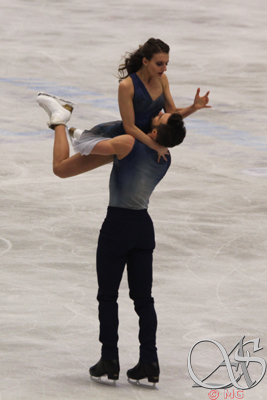 Do you intend to explore some new paths?
Do you intend to explore some new paths?
We started a path two years ago with the Mozart piece and I think we have to go further in this path. We see the free dance as something that has to be in touch with our world. The exercise of the short dance is more about testing different styles and rhythms. In ice dance we usually see couples changing completely from one year to the other. Of course we want to keep improving but we don't want to do an Egyptian program one year, then a flamenco... that's not what we're interested in. We think more about how we like to move and what emotion we want to create for the audience. We like more abstract things.
Are your short dance and free dance still works in progress?
It's always work in progress. We value feedback and advice from the federation, the judges. We're always trying to improve, it's never over, really. We'll probably make a few changes in the free dance, because it's a risky project and it's not mature yet. Everyone likes the second part because everyone likes good, lyrical music. The first half is more risky. Some might say it's too intellectual. I think we have a lot of work to do to make it work as a whole piece that stands together and make it speak to everyone without questions. We want to work on that, keep the essence of the program and make a few changes.
Perhaps people find the first part of your music more difficult to relate to.
We don't want the focus to be on the music. We have been working on more complex ways of moving, different energies and that's where we want the focus to be. We could use this approach with a different music and create a different feeling that might be as good. It's not really about the music. The music must support what we are doing and not the opposite.
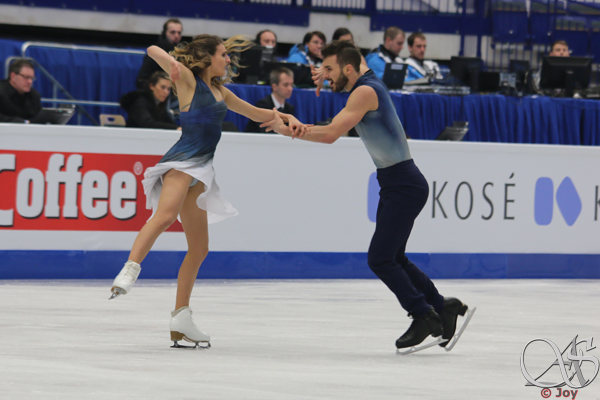
You are a couple who could do the same dance on the floor and still be world class. You are using whole body movement to an unprecedented degree for ice dance, throughout the program. What is your dance background? What work do you do off-ice to reach this level?
I wish we had more time to go further in this dance research off-ice. We try to do as much as we can. We have covered many styles during our junior years: ballroom, any kind of dance really.
Did you start ballet early? Is it in your weekly routine?
No. I think we naturally have a lyrical way of moving. 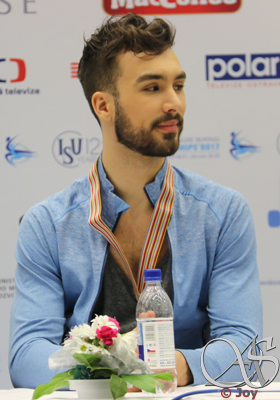 This way of moving - very round - just comes naturally to us.
This way of moving - very round - just comes naturally to us.
We'll probably stay in Montreal for our whole career.
What is your daily routine in Montreal?
We usually practice three to four hours a day on the ice. We go to the rink early, warm up and have two sessions on the ice. Then we either go to the gym or have interpretation classes with an artistic coach, Chatherine Pinard. We have been working with her for two years.
How do you work with the rest of your coaches? What is the division of labour?
All of our coaches are able to teach all aspects, but usually Romain does the short dance choreography, Marie-France does the free dance. Patch is more like an expert on step sequences, technical aspects, lifts etc.
Of course Dubreuil and Lauzon have been coached by Muriel Zazoui for years, as have you. What has changed in your coaching situation in Canada?
The 2014-2015 year was a big step for us. These three main coaches are the strongest team we have ever had. Just knowing that we had a team that is so powerful and caring is a strength.
What is the difference in feeling between skating in France and in Montreal?
In Canada we have less media attention becase obviously we're far from home. It's sad to be far away from friends and family but it's also necessary when you want to be focusing with 100% commitment every day. It's hard to be at that level in the midst of friends and family.
Do you intend to stay in Canada after the Olympics? 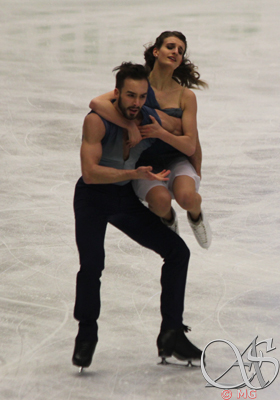
We'll probably stay in Montreal for our whole career because we have a strong team that we like and that works well.
Which means you are continuing to compete after the Olympics?
I think so. I can't tell for sure.
Sometimes our deep edges can be a disadvantage.
Your skating improved a lot between your first world title and the second. Is there any aspect of your skating that you still want to improve?
Sometimes our skating technique, our deep edges can be a disadvantage. It can be easier to do clean turns with shallower edges, skating stiffer. We have this flow naturally, but we have to focus on sometimes toning down our knee action in order to perform what is expected from us technically during the step sequences.
During competitions, do you get feedback from the judges or technical specialists? For instance do you know why you lost the level in the twizzle sequence in the free dance?
Yes, we get feedback. We had a meeting with our coaches and know where we lost the levels. Sometimes there are some mistakes that are easy to fix and we wish we had known before. For instance here we had too many steps between the twizzles. It was a gray area because we have a jump, and they counted the landing as one more step. It depends on the technical specialist's interpretation of the rule. In the previous competitions no one had brought it to our attention.
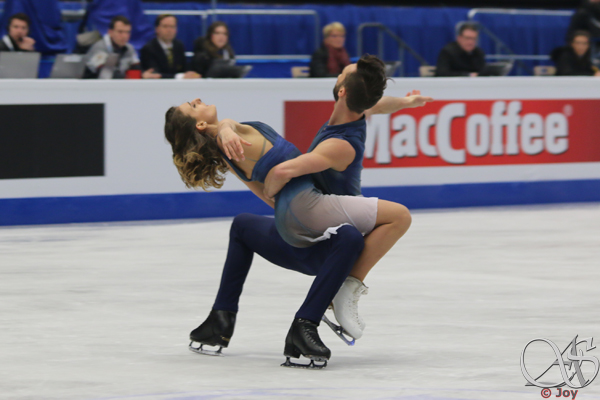
I never identified with former ice dance couples because I never believed we would get this far.
While you were growing up, did you have any ice dance couples that you looked up to and saw as role models?
I didn't really watch skating on TV.
Until what age?
Until now! I love skating but I don't really ever watch it. I'm not the only one who's like that. I will enjoy a good performance in any skating discipline though, it's a beautiful sport.
When I was younger Isabelle Delobel and Olivier Schoenfelder were one of my favorites because they were French and they had beautiful programs. I didn't identify with them or any other couples because I never believed we would make it this far.
When did you start believing that you were getting there? 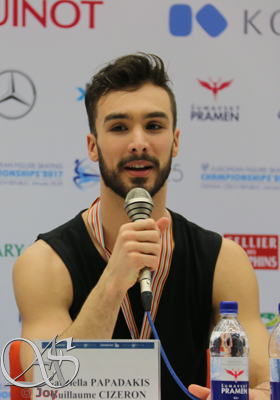
Maybe during our last year in juniors when we came second in Junior Worlds. I thought: "O.K. maybe we'll achieve something." We started taking things really seriously once we moved to Canada. Before that we knew we had a good junior year but it wasn't real yet.
What do you think about the young French ice dance couples. Do you follow the juniors?
Yes, I think we have great teams. It's great that Anjelika and Louis made it to the final. It's harder to make it to the final as juniors.
I've always wanted to be a fashion designer.
What music do you listen to?
I listen to a lot of rhythm and blues and pop music. Right now I'm listening to The Weeknd, his new album is really great.
I understand you have designed your free dance costumes. Have you designed any other costumes before?
I've been helping the Danish couple (Laurence Fournier Beaudry and Nikolaj Sørensen) with their costumes. I gather everybody's ideas and draw something out of it but I'm not in charge of the whole decision. It's a group decision.
Are you interested in a career in fashion?
Yes, I've always wanted to be a fashion designer. I think I'll do that after skating, one day.
Finally, is there anything you would like to say to the fans?
I would like to say a huge thank you to the fans. What we do would have no sense without them and it's really generous of them just to be here and to support our skating.
